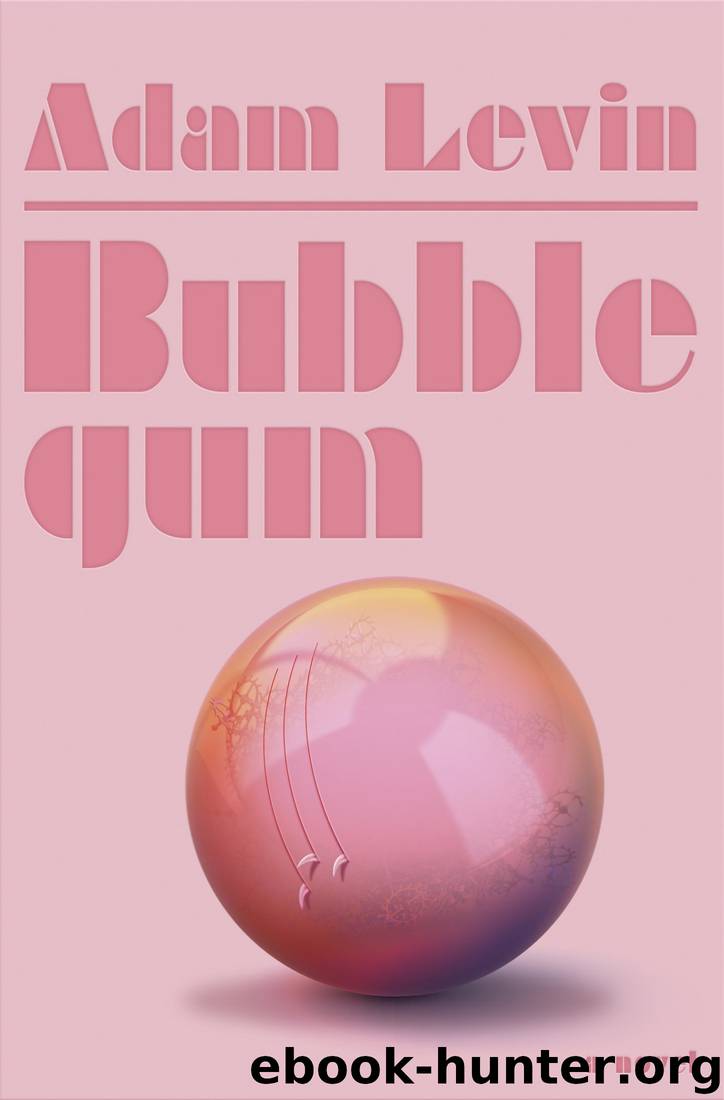Bubblegum: A Novel by Adam Levin

Author:Adam Levin
Language: eng
Format: epub
Publisher: Doubleday
Published: 2020-04-13T23:00:00+00:00
[Mid-to-late 1990s. 6 minutes, 14 seconds.]
A seminar room. Eleven university students sit along either longer side of a table, writing in notebooks or looking toward the broad-shouldered, thirtysomething teacher, who sits alone at the end of the table, facing the viewer. Behind him stands a movable blackboard on which are chalked the words usage and meaning. “…So my hope for this workshop…” the teacher is saying, and, clenching his jaw and flaring his nostrils, nose-sighs audibly and, momentarily, widens his eyes as if to express that the words he’s just uttered or is about to utter are surprising, suspect, or perhaps even painful. “One hope I have for this workshop,” he continues, “is that by the end of the semester, I’ll not only have accurately described some of my linguistic neuroses to you, but I’ll have infected you with them—I’ll have made you neurotic about language in the way that I am neurotic about language. Or to put it in a more, I don’t know, new-agey light, I guess: I’ll have invited you into the, um, grand tradition of sharing my concerns and sensibilities, and you’ll have gladly taken me up on that invitation. I want you to care about how things are said. I want you to understand that it’s impossible to care about what things are said without thinking about how those things are said. I want, for example, for you to learn how to care about such distinctions as exist between the phrases ‘Dave overloaded’ and ‘Dave went into overload.’ I want you to notice that ‘Dave overloaded’ sounds klutzier than ‘Dave went into overload,’ at least outside the context of whatever utterances would presumably be surrounding either of them in some prose you might be working on, and I want you to wonder why. Probably—this is usually the case—probably it’s because the stressed syllables aren’t properly—which is to say fluidly or powerfully—dispersed across the phrase. Maybe, too, the klutziness has something to do with the v-sounds and/or d-sounds. I want you to develop the urge to control this kind of thing. And I want your impulse to be to wonder at the klutziness and experiment a little in hopes of finding out how to get rid of it. Maybe you start with ‘Dave.’ Does he have to be ‘Dave’? Could the subject instead be ‘David’ or ‘He’? ‘David overloaded.’ ‘He overloaded.’ In terms of aural pleasure, I quite like ‘David overloaded.’ The stresses fall more pleasingly and the relative excess of v- and d-sounds comes across as intentional, but not too intentional. Not overclever. Not cute. The phrase is not unspeakerly. Is ‘David overloaded’ the phrase you choose to go with, then? Have we settled matters? Well, no, not really. Not so fast. Because I don’t just want you to care about the way the sounds feel on your eardrums. I want you to care about the way the feeling of the sounds on your eardrums affects the meaning of the phrase. ‘David overloaded,’ whether in
Download
This site does not store any files on its server. We only index and link to content provided by other sites. Please contact the content providers to delete copyright contents if any and email us, we'll remove relevant links or contents immediately.
Sita - Warrior of Mithila (Book 2 of the Ram Chandra Series) by Amish(54894)
The Crystal Crypt by Dick Philip K(36867)
Cat's cradle by Kurt Vonnegut(15352)
Always and Forever, Lara Jean by Jenny Han(14920)
Ready Player One by Cline Ernest(14675)
The Last by Hanna Jameson(10257)
Year One by Nora Roberts(9800)
Persepolis Rising by James S. A. Corey(9371)
The remains of the day by Kazuo Ishiguro(8999)
Never let me go by Kazuo Ishiguro(8900)
Red Rising by Pierce Brown(8785)
Dark Space: The Second Trilogy (Books 4-6) (Dark Space Trilogies Book 2) by Jasper T. Scott(8193)
The handmaid's tale by Margaret Atwood(7763)
The Circle by Dave Eggers(7114)
Frank Herbert's Dune Saga Collection: Books 1 - 6 by Frank Herbert(7086)
The Testaments by Margaret Atwood(6902)
Legacy by Ellery Kane(6658)
Pandemic (The Extinction Files Book 1) by A.G. Riddle(6538)
Six Wakes by Mur Lafferty(6256)
